虚拟语气在条件状语从句中的用法if条件句.ppt
虚拟语气在if句的用法PPT幻灯片
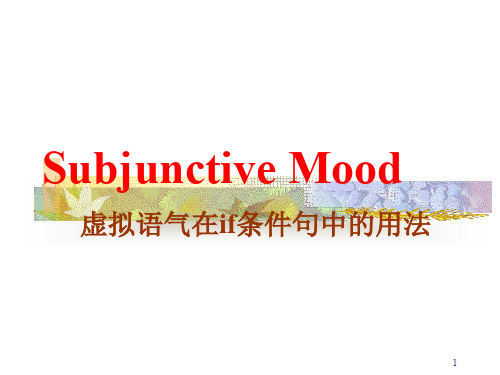
If you had worked hard ,you would have passed the exam .
9
If they had had enough rain last year, they would have gained good harvest.
10
If he had driven more carefully yesterday, he would not have had the car accident .
13
If it were/ should be fine tomorrow , I would go to see him.
14
One years later ,maybe you will be in University
If I should visit/ were to visit/ visited my alma
11
Discover2
1.If you had worked hard ,you would have passed the exam . 2.If they had had enough rain last year, they would have gained good harvest. 3.If he had driven more carefully yesterday, he would not have had the car accident.
2
These show your good wishes or dreams. It is evident that they are not real or they can’t come true
表示说话人的愿望、假设、猜测或 建议,而不表示客观存在的事实。
虚拟语气讲解课件ppt.ppt

虚拟语气
虚拟语气在:在宾语从句中
[例句]
1. I wish she would be on my side. 我希望她能站在我一边。
2. I wish I were 10 years younger. 我但愿自己能年轻十岁。
3. I wish (that) you would get a good job. 我希望你能找到一个好职业。
• He insisted that he was right. 他坚称他是正确的。
认识到了贫困户贫困的根本原因,才 能开始 对症下 药,然 后药到 病除。 近年来 国家对 扶贫工 作高度 重视, 已经展 开了“ 精准扶 贫”项 目
虚拟语气
虚拟语气在:在宾语从句中
• 在would (had) rather(宁愿) 引导的宾语从句中
[例句] • It’s necessary that we should have a walk now.
我们有必要出去散散步。
• It’s natural that she should do so. 她这样做是很自然的。
1. It’s important that we should take good care of the patient. 重要的是我们要照顾好病人。
一、在条件从句中 (叫虚拟条件句),表示与事实相反 的条件。分三种情况(以 do 为例):
认识到了贫困户贫困的根本原因,才 能开始 对症下 药,然 后药到 病除。 近年来 国家对 扶贫工 作高度 重视, 已经展 开了“ 精准扶 贫”项 目
虚拟语气
虚拟语气在 在条件从句中
[例句]
• If you had come a few minutes earlier, you would have met him.
虚拟语气在条件状语从句中的用法(if条件句)

在写作中的应用
创作文学作品中
在创作小说、诗歌等文学作品时, 虚拟语气可以用来表达虚构的情 节和角色情感,增强作品的情感
色彩和艺术效果。
撰写学术论文
在撰写学术论文时,使用虚拟语 气可以表达假设的情景或条件, 例如在讨论不同政策或方案的影
响时。
写邮件和信件
在写邮件或信件时,使用虚拟语 气可以表达礼貌和尊重,例如在
在撰写商务广告和宣传材料时,使用虚拟语气可以增强语 言的感染力和说服力,例如“假如您正在寻找更好的产品 ,那么您来对了地方。”
感谢您的观看
THANKS
if条件句中的虚拟语气与时间状语从句的时态不一致
总结词
当if条件句中的虚拟语气与时间状语从句的时态不一致 时,通常是为了强调或表达与时间状语从句相反的情 况。
详细描述
在英语语法中,当if条件句中的虚拟语气与时间状语从 句的时态不一致时,通常是为了强调或表达与时间状语 从句相反的情况。这种用法能够使句子更加生动和富有 表现力,突出说话者对某个特定时间点的态度或情感。 例如,在句子"If I had known the answer yesterday, I would have told you."中,虚拟语气"had known" 与时间状语从句的时态"yesterday"不一致,强调了说 话者对过去的遗憾或后悔。
虚拟语气在条件状语从 句中的用法(if条件句)
目录
CONTENTS
• 虚拟语气在条件状语从句中的基本结构 • 虚拟语气在条件状语从句中的用法 • 虚拟语气在条件状语从句中的特殊情况 • 虚拟语气在条件状语从句中的实际应用
01 虚拟语气在条件状语从句 中的基本结构
if条件状语从句课件
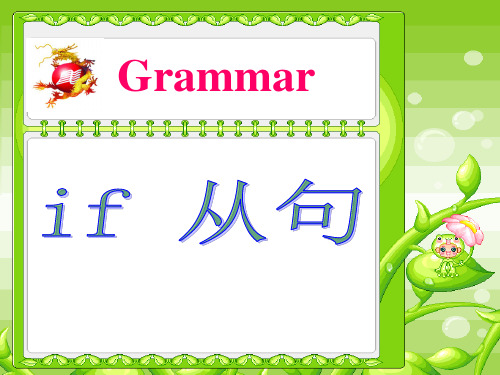
2. 如果主句是一般将来时, if从句则用一般现在时。 If it rains(从句), I will stay at home. I’ll go with you if you don’t want to go alone(从句). 3.如果主句含有must, may, can 等情态动 词,if从句也要用一般 现在时。 If you drive too fast, you may have an accident. You must stop if the traffic is red.
主将从现 祈使句 情态动词 I will sing a song if I am happy.
Don’t cross the road if the light is red You must stop if the traffic light is red.
if (如果)引导的条件状语从句:
Grammar
If 引导条件状语从句
定义:if
“如果, 假如” 它引导的句子表示某事发 生所需的条件,即“在…条件下,某事才能发生”, 在句子中充当状语,因此称之为条件状语从句。 ( If引导的条件状语从句表示假如有从句的动作发 生,就会有主句动作的发生 )
位置:从句可放在主句之前或之后,但是放在主句之
Remember:
• 1.主祈从现 • 2.主将从现 if… will/won’t • 3.主情(can,may,should, must)从现
高考英语if条件状语从句课件(共34张PPT)
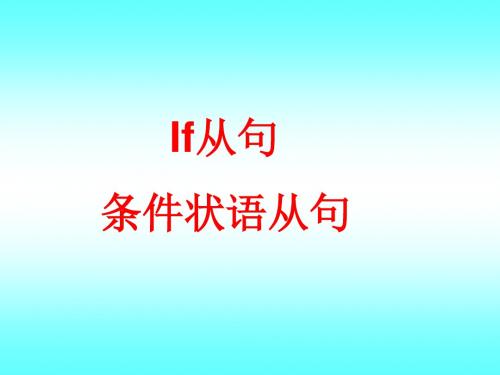
If条件句:条件句用于陈述语气,表示假设的情况可能发生,
其中 if 是“如果”的意思。
构 成
条件从句
主句
时 态
If+一般现在时 主语+shall/will+动词原形
例 句
If he comes,
he will take us to the zoo.
用法:
1. 如果主句是一般将来时,从句则用一般现在时。
3. 如果主句是祈使句,从句同样要用一般现在时。
Don’t go and play football if you don’t finish your homework.
Please call me if he comes next Sunday.
4.表示假设,表示将会发生和可能发生的事,
或进行提醒警告。 If +句子(一般现在时),+主句(主语will/may/can) +动词)
a good one.
4. If the light _d_o_e_s_n_’t__co_m__e_ (not come) on, _w__a_it (wait) for one minute.
If 条件状语从句(1)
句型结构
祈使句+if条件状语从句 if条件状语从句,+祈使句(从句后加逗号)
时态
果不早点起床,上学就会迟到。
2. If I play games on it , it will go wrong .
如果我用它玩游戏,它就会坏掉。
3. If you finish the homework, you can go home. 如果你作业做完了就可以回家了。
4. If you want to lose weight you must/should eat less bread. 如果你想减肥,你必须少吃面包。 5.If you heat ice it turns to water. (也可用will turn) 如果把冰加热,它就会化成水。
if虚拟语态PPT课件

第31页/共35页
Kitty talks as if she ______ on the spot. A. is B. were C. has been D. be
Key: B
第32页/共35页
Subjunctive
Mood
用在状语从句中 (一)
说明
例句
虚拟语气用在由as if 或 as though 引导的比较 方式状语从句中,其谓语 动词形式与 wish 后的宾 语从句中的谓语动词形式 相同
当虚拟条件句含有were, had, should时,可以省略if,而把were, had, should 移到主语之前,即用倒装句
第13页/共35页
If sb were sth/sb,Sb would do sth. If I were you,I would not do like that. Were I you,I would not do like that.
第14页/共35页
If sb were sth/sb,Sb would do sth. If I were you ,I would ask our teacher for advice. Were I you ,I would ask our teacher for advice.
第15页/共35页
第33页/共35页
二. 虚拟语气在as if (as though)等引导的从 句中.
They look as if they were real brothers. 他们俩看起来好像真的是亲兄弟一样。
第22页/共35页
2.表示过去的事实相反,谓语动词用过去 完成式。例如: He talks as if he had really been there. 他说得好象他当时真的在那里一样。 He talked as if nothing had happened. 他说得好像什么事情也没有发生过。
虚拟语气课件(if ,wish)

A
A
B
B
B
3. I didn’t know her telephone number and I didn’t call her. If I had known her telephone number, I would have called her. 与过去事实相反的假设虚拟: 句型:If sb. had done sth. , sb. would/ could/ should / might have done sth.
如果我有一台靓车, 我就很开心啦
If I had a beautiful car, I would be very
happy.
Unit1 Grammar
本节课的学习内容
• • • • 1.了解虚拟语气的定义 2.掌握if条件句中的虚拟语气 3.掌握if条件句中的虚拟语气的省略 4.掌握虚拟语气在wish后的宾的定义
虚拟语气表示说话人所说的话不是事实, 而是一种假设,愿望,怀疑或推测。 它主要用于if条件状语从句,也可以用于 主语,表语,宾语从句等。 P86
1.I suggest that you should study hard. 虚拟语气 2.If I had enough money ,I would treat you all to ice creams. 虚拟语气
二:If条件句中的虚拟语气
• 它可以表示对过去,现在,将来情 况的虚拟
判断以下句子表示的是过去,现在,还是将来的情 况 1. I don’t have a car and I’m not happy. 现在的事实 2. I’m not a bird. I can’t fly. 现在的事实 3. I didn’t know her telephone number and I didn’t call her. 过去的事实 4. I won’t go there. So I won’t meet him there.
虚拟语气在条件状语从句中用法if条件句
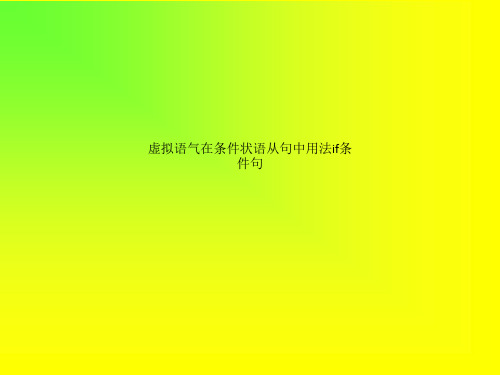
虚拟语气
Exercises
1. Alan ___ the party if he had gone to London.
2. A. would have missed B. had missed
3. C. would miss
D. missed
4. 2. If I knew you were coming, I ___ you at the airport.
She was honoured by people all over the world,
Because She was an inventor and a scientist .
Because She was given the
Nobel Prize for Chemistry in
1911 .
• If I were a designer , I would design a spaceship .
• If I were clever enough , I would have designed a spaceship.
• If I were an astronaut , I would travel into space.
虚拟语气
6. Simon looks as though he never ___ a square meal(吃得饱), though his parents feed him very well. A. get B. getting C. got D. should get
7. He is talking so much about America as if he ___ there. A. had been B. were C. was D. been
if引导虚拟语气条件句PPT课件

06
总结与回顾
回顾if引导虚拟语气条件句的用法
虚拟语气在条件句中的用法
在条件句中,使用虚拟语气表示与实际情况相反的情况,或者表 示假设、猜测等。
虚拟语气的形式
虚拟语气有多种形式,包括与现在事实相反、与过去事实相反、与 将来事实相反等。
虚拟语气的时态
虚拟语气与时态有关,需要根据实际情况选择适当的时态。
况,主句用would+have+过 去分词的形式。
翻译题
01
02
03
中文
如果我知道这个消息,我 早就告诉你了。
英文
If I had known the news, I would have told you long ago.
解释
从句表示与过去事实相反 的情况,主句用 would+have+过去分词 的形式。
题目
If he _______ the money, he _______ able to buy a car.
had had; would be
答案
解释
从句表示与过去事实相反的情况,主句用would+______ rained last night,
the ground would be wet this morning.
表示与事实相反的情况
总结词
与事实相反的情况是指条件句中的假设与现实情况相 反,主句使用虚拟语气表示与实际情况的差异。
详细描述
在英语中,当if引导的条件句表示与事实相反的情况时, 主句通常使用虚拟语气。这种用法常用于表示某种假设 的情况并未实现,而是与现实情况相反。例如,“If I were you, I would not make that mistake again.” (如果我是你,我不会再犯那个错误了。)这句话表示 的是假设自己是对方,但实际上并不是,提醒对方不要 犯同样的错误。
if的用法总结及例句PPT
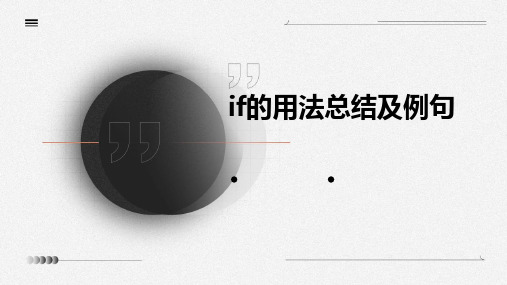
与“in case”的联系
in case可引导目的状语从句,相当于if引导的条件状语 从句。例如:“Take an umbrella in case it rains.”( 带把伞以防下雨。)
熟练运用if在固定短语和句型中应用
“If only”句型
表示对现在或将来的虚拟假设, 通常用于表达遗憾或愿望。例如 :“If only I had more time, I could finish the project.”(要 是我有更多的时间,我就能完成 这个项目了。)
典型例句
01
If it rains tomorrow, we will stay at home.(如果 明天下雨,我们就呆在家里。)
02
If I were you, I would take the job.(如果我是你 ,我就会接受这份工作。)
03
If he had known the answer, he would have told me.(如果他知道答案,他就会告诉我。)
功能
用于表达在某种条件下会产生的结果 或采取的行动。
结构特点
01
if从句+主句
if引导的条件状语从句通常位于 主句之前,由if引导,后面紧跟 主句。
时态呼应
02
03
虚拟语气
if从句中的时态通常与主句中的 时态相呼应,表达相应的假设条 件。
在if引导的虚拟条件句中,从句 和主句的时态往往采用虚拟语气 ,表达与事实相反的情况。
“As if/though”句 型
引导方式状语从句,表示比喻或 虚拟的情况。例如:“She speaks English as if she were a native speaker.”(她说英语就 像以英语为母语的人一样。)
if条件状语从句复习-自己上课课件课件PPT

• if条件状语从句的定义和结构 • if条件状语从句的时态 • if条件状语从句的用法 • if条件状语从句的注意事项 • if条件状语从句的练习与巩固
01
if条件状语从句的定义和结构
定义
总结词
if条件状语从句是一种表示假设条件 的从句,通常用于描述在某种条件下 某件事情会发生或不会发生。
总结词
表示过去的条件或假设。
详细描述
If条件状语从句的过去时态通常用于表示过去的条件或假设,主句和从句的谓语动词 通常使用一般过去时。例如,“If he had known the answer, he would have told you.”(如果他当时知道答案,他就会告诉你。)
将来时态
总结词
详细描述
if条件状语从句是英语语法中的一种重 要从句类型,它通常以“if”作为引导 词,后面跟随一个表示条件的子句, 再接着是一个表示结果的子句。
结构
总结词
if条件状语从句的结构包括引导词“if” 、条件子句和结果子句三部分。
VS
详细描述
if条件状语从句的结构通常为“if+条件子 句(用一般现在时表示),则+结果子句”。 例如,“If it rains tomorrow, we will stay at home.”(如果明天下雨,我们就 会待在家里。)在这个例子中,“if it rains tomorrow”是条件子句,“we will stay at home”是结果子句。
02
if条件状语从句的时态
现在时态
总结词
表示当前存在的条件或假设。
详细描述
If条件状语从句的现在时态通常用于表示当前存在的条件或假设,主句和从句的 谓语动词通常使用一般现在时。例如,“If you study hard, you will succeed.” (如果你努力学习,你就会成功。)
IF条件句中虚拟语气(微课)PPT课件
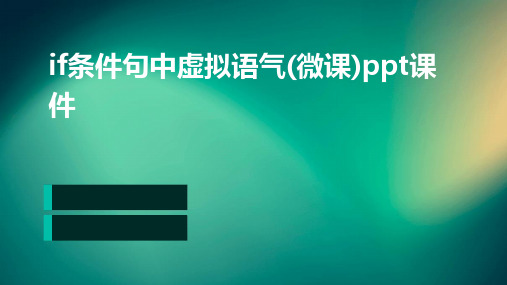
03 if条件句中虚拟语气的用 法
表示与事实相反的情况
结构
与现在事实相反,从句用“if+主 语+动词过去式”,主句用 “would+动词原形”。
举例
If I were you, I would choose to study abroad.(如果我是你,我 会选择出国留学。)
表示假设条件
结构
假设条件句可以用“if+主语+动词过 去式+其他”,表示在假设条件下可 能发生的情况。
虚拟语气与其他从句的区别
虚拟语气在if条件句中的用法与其他从句有所不同,需要注 意区分。
例如,与if条件状语从句相比,虚拟语气在表达与事实相 反的情况时,主句和从句的谓语动词形式会有所不同;与 if时间状语从句相比,虚拟语气更加注重假设和想象,而 非真实的时间顺序。
05 if条件句中虚拟语气的练 习与巩固
在主句和从句中,时态的一致性是虚 拟语气的基本要求,否则会导致语法 错误或语义混淆。
主从句时态对应关系
在if条件句中,虚拟语气的主句和从句时态有一定的对应关系 。
如果主句是虚拟现在时,从句通常也是虚拟现在时;如果主 句是虚拟过去时,从句通常也是虚拟过去时;如果主句是虚 拟将来时,从句通常也是虚拟将来时。
02 if条件句中虚拟语气的形 式
与现在事实相反的虚拟语气
总结词
表示与现在事实相反的情况,通常使用动词的过去式。
详细描述
在if条件句中,当表示与现在事实相反的情况时,从句使用动词的过去式(be动词 用were),主句使用would+动词原形。例如,“If I were you, I would choose to study abroad.”(如果我是你,我会选择出国留学。)
虚拟语气课件

主语从句中的虚拟语气
“ It is(was)+ 形容 表达形式为 should+动词原形或省略 should 词(或过去分词) +that….” 结构中的 虚拟语气 常 用 的 形 容 词 : natural , appropriate , advisable , necessary , important , urgent , probable , possible , desiraat 引出的宾语从句中, 谓语动词也要用虚拟语气。 例:I don’t think it advisable that tom be assigned to the job since he has no experience.(汤姆缺乏经验,指派他做 这项工作我认为是不恰当的)
表语从句或同位语从句中的虚拟语气
某些表示建议,请 表达形式为 should+动词原型或直接用动词原型。 求,命令等主观意 向的名词做主语 时,其后的表语从 句或同位语从句需 这类名词常见的有: demand, desire, requirement, advice, 用虚拟语气 recommendation, suggestion, order, necessity, proposal, plan,idea。
宾语从句中的虚拟语气
在动词 wish 后的 对现在情况的虚拟:从句谓语动词用过去式或过去进行 宾语从句中的虚拟 式。 语气 对过去情况的虚拟:从句谓语动词用过去完成时,或 would,could,might+现在完成时。 对将来情况的虚拟:从句谓语 “would/should/could/might+动词原形” 。
宾语从句中的虚拟语气
在表示建议, 命令, 均以“should+动词原型”表示这种语气, “should”常被 要求,忠告,等动 省略。 词的后面的宾语从 句中的虚拟语气 常用的此类动词有: 表示“提议,劝告,建议”的: propose,suggest,recommend,advise. 表示“要求”的:ask,desire, request,demand,require,beg 表示“同意,坚持”的:insist 表示“决定,命令”的:decide,order 注意:suggest,insist 不表示建议或坚持要某人做某事时, 即它们用于其本意暗示,表明,坚持认为时,宾语从句用 陈述语气。
虚拟语气思维导图 PPT
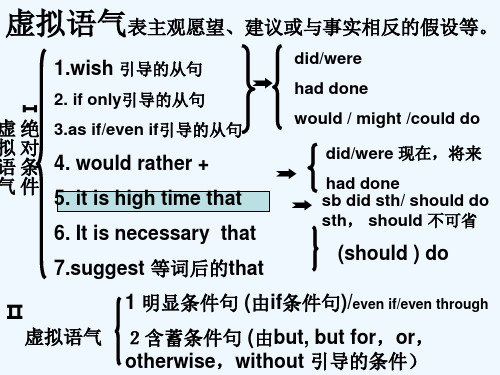
大家应该也有点累了,稍作休息
大家有疑问的,可以询问和交流
It’s necessary /strange/ natural/ important + that---Clause 从句中的动词要用虚拟,即 (should)+动词原形
我们很有必要/重要掌握一门外语
It is important / necessary that we ( should ) master a foreign language.
wish后面的宾语从句要用虚拟语气
did/were wish + that clause had done
would / might //could do
我要是记得地址就好了。(真可惜我忘了) I wish I remembered the address.
要是他没有离开这里就好了。(他已离开)
I wish he had not left. 要是明天下雨就好了。(说话人以预料明天不会下雨) I wish it would rain tomorrow.
虚拟语气表主观愿望、建议或与事实相反的假设等。
Ⅰ
1.wish 引导的从句
2. if only引导的从句
虚 绝 3.as if/even if引导的从句 拟对 语 条 4. would rather + 气件
5. it is high time that
6. It is necessary that 7.suggest 等词后的that
她谈论那部影片,就好像她确实看过一样。
She talked about the film as if she had really seen it.
if条件状语从句学校课件
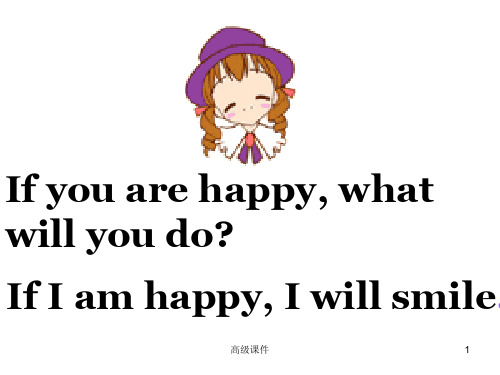
时态--主将从现 主句一般将来时, 从句一般现在时
高级课件
6
Revision
if条件状语从句结构及时态
1. 如果主句是一般将来时,从句则用一般现在时。
If it rains(从句), I will stay at home. I’ll go with you if you don’t want to go alone(从句).
listen to teachers carefully.
do homework by yourself.
• If you want to get good marks,
• don’t _c_o_p_y_y_ou_r_h_o_m. ework.
talk in the class
cheat in the 高e级x课a件ms
4.如果你去, 我也去。 If you go,I will go.
5.如果明天下雨,请带雨衣。 raincoat
Please take a raincoat if it rains.高级课件8p Nhomakorabeaactice
If you are free this weekend, what will you do ?
1.-how can I remember my friends’ birthdays? -If_y_o_u__ke_e_p__a_n_o_te__in__yo_u_r__d_ia_r_y_, _yo_u__w_o_n_’_t _fo_r_g_e_t.__ (keep a note in your diary / not forget).
高级课件
19
1. Can you tell me if she can come to the meeting ?
if条件状语从句中虚拟语气
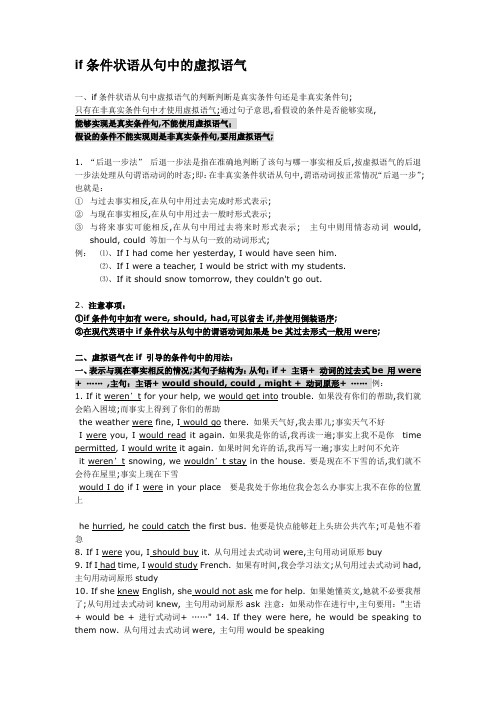
if条件状语从句中的虚拟语气一、if条件状语从句中虚拟语气的判断判断是真实条件句还是非真实条件句;只有在非真实条件句中才使用虚拟语气;通过句子意思,看假设的条件是否能够实现,能够实现是真实条件句,不能使用虚拟语气;假设的条件不能实现则是非真实条件句,要用虚拟语气;1. “后退一步法”后退一步法是指在准确地判断了该句与哪一事实相反后,按虚拟语气的后退一步法处理从句谓语动词的时态;即:在非真实条件状语从句中,谓语动词按正常情况“后退一步”;也就是:①与过去事实相反,在从句中用过去完成时形式表示;②与现在事实相反,在从句中用过去一般时形式表示;③与将来事实可能相反,在从句中用过去将来时形式表示;主句中则用情态动词would,should, could 等加一个与从句一致的动词形式;例:⑴、If I had come her yesterday, I would have seen him.⑵、If I were a teacher, I would be strict with my students.⑶、If it should snow tomorrow, they couldn't go out.2、注意事项:①if条件句中如有were, should, had,可以省去if,并使用倒装语序;②在现代英语中if条件状与从句中的谓语动词如果是be其过去形式一般用were;二、虚拟语气在if 引导的条件句中的用法:1. If it weren’t for your help, we would get into trouble. 如果没有你们的帮助,我们就会陷入困境;而事实上得到了你们的帮助the weather were fine, I would go there. 如果天气好,我去那儿;事实天气不好I were you, I would read it again. 如果我是你的话,我再读一遍;事实上我不是你time permitted, I would write it again. 如果时间允许的话,我再写一遍;事实上时间不允许it weren’t snowing, we wouldn’t stay in the house. 要是现在不下雪的话,我们就不会待在屋里;事实上现在下雪would I do if I were in your place要是我处于你地位我会怎么办事实上我不在你的位置上he hurried, he could catch the first bus. 他要是快点能够赶上头班公共汽车;可是他不着急8. If I were you, I should buy it. 从句用过去式动词were,主句用动词原形buy9. If I had time, I would study French. 如果有时间,我会学习法文;从句用过去式动词had,主句用动词原形study10. If she knew English, she would not ask me for help. 如果她懂英文,她就不必要我帮了;从句用过去式动词knew, 主句用动词原形ask 注意:如果动作在进行中,主句要用:"主语+ would be + 进行式动词+ ……" 14. If they were here, he would be speaking to them now. 从句用过去式动词were, 主句用would be speaking例如:⑴、If you had taken my advice, you would not have made such a mistake.如果你听了我的劝告,就不会犯这样的错误;事实上你没有听我的劝告⑵、I shouldn’t have been able to write such good novels if I hadn’t lived among the peasants for five years.如果我不是和农民生活了五年,就不可能写出这样好的小说;事实上我和农民生活了五年⑶、If you hadn’t invited me, I shouldn’t have come to the party.如果你不邀请我,我就不会来参加你的舞会;事实上你邀请了我⑷、If I hadn’t been ill yesterday, I might have come to school.昨天要是不生病,我是可能来上学的;事实上我生病了⑸、If he hadn’t broken the law, he wouldn’t have been put in prison.如果他不违法的话,就不会被打入监狱;事实上他违法了⑹、If I had been your headmaster, I should have dismissed you from school. 我要是你们校长的话,就把你开除学籍了;事实上我不是注意:如果动作在进行中,主句要用:"主语+ would + have + 完成进行式动词+……⑺、If they had been here, he would have been speaking to them.从句动词用had been, 主句动词用have been speaking⑴、I f I were to work at this problem, I would do it in another way.要是我来解这道难题,我会用另外一种方法的;⑵、I f you were to do such a thing again, you would be punished. 如果你再做这样的事情,就会受到惩罚;⑶、I f I should work harder, I could make much more progress.假如我更努力学习的话,我会取得更大的进步;事实上我不可能努力学习⑷、I f it should rain tomorrow, I would stay at home.如果明天下雨的话,我将待在家里;根据天气情况,明天不可能下雨⑸、I f he should come, I could ask him for some advice.万一他来了,我就能够向他请教;事实上他来的可能性很小⑹、I f he came tomorrow, I would do it with him.如果明天他来的话,我将和他一起做此事;事实上他来的可能性很小⑺、If it should rain, the crops would be saved.从句动词用should rain,主句动词用be 如果天下雨,庄稼可能就收获了;⑻、If he were here, I would give him the books.从句动词用were, 主句动词用give 如果他在这儿,我可能会把书给他;注意:如果动作在进行中,从句不是主句要用:"If + 主语+ 过去进行式动词+……"⑼、If she were staying here now, I would let her ride my horse.从句动词用were staying, 主句动词用let如果她现在留在这儿,我可能会让她骑我的马;。
if条件句中的虚拟语气讲解
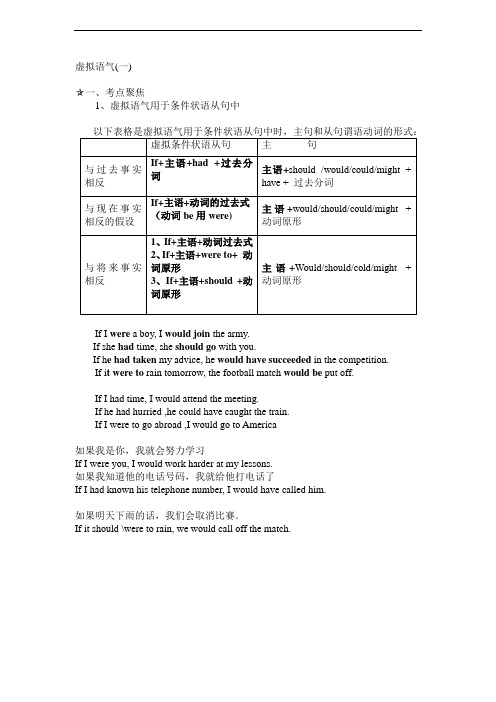
虚拟语气(一)一、考点聚焦1、虚拟语气用于条件状语从句中If I were a boy, I would join the army.If she had time, she should go with you.If h e had taken my advice, he would have succeeded in the competition.If i t were to rain tomorrow, the football match would be put off.If I had time, I would attend the meeting.If he had hurried ,he could have caught the train.If I were to go abroad ,I would go to America如果我是你,我就会努力学习If I were you, I would work harder at my lessons.如果我知道他的电话号码,我就给他打电话了If I had known his telephone number, I would have called him.如果明天下雨的话,我们会取消比赛.If it should \were to rain, we would call off the match.使用虚拟条件句要注意的几点:1.当条件状语从句表示的行为和主句表示的行为所发生的时间不一致时,被称为:错综时间条件句“,动词的形式要根据它所表示的时间作出相应的调整.If you had followed my advice , you would be better now.如果你听我的建议,你现在就会痊愈了.If you had studied hard before, you would be a college student now.如果你努力学习的话,你现在就会是大学生了.If they had worked hard, they would be very tired now.(从句说的是过去,主句指的是现在)2.省略句在条件句中,可省略if,把were ,had, should 提到句首,变为倒装句式.If I were at school again, I would study harder.Were I at school again, I would study harder.If you had come earlier, you would have met him.Had you come earlier, you would have met him.If it should rain tomorrow, we would not go climbing.Should it rain tomorrow, we would not go climbing.Were I a boy, I would join the army.Had he taken my advice, he would have succeeded.Were it not for the expense, I would go to Britain.2、虚拟语气用于名词性从句(1)虚拟语气在宾语从句中的运用。
if引导条件状语从句虚拟语气

虚气是一法点,了学便于理解与,我把虚气分红三大来:1.名从句中的虚气2.条件从句中的虚气志 +should+ 原形①三种基本②倒装虚句③混虚句④委婉虚句⑤跳虚句3.其余情况中的虚气( wish/would rather/It ’s high time ⋯/If only ⋯/lest )一.三种基本形( 1)表虚的 if从句形式主句形式在: did / were would (should, might, could)+do去: had done/ had been would (should/might/could)+have done(been)未来: were to/ should+do would (should, might, could)+do三种基本形( 2)(是基,建牢下边的例句,争取能信口开河)与在事相反: If I had enough money, I would buy a book.与去事相反: If I had had enough money, I would have bought a book.与未来事相反: If I were to have enough money, I would buy a book.If I should have enough money, I would buy a book.二、倒装虚句(只好与去/ 未来事相反,省去if ,只有三种倒装形式)Had I had enough money, I would have bought a book.Were I to have enough money, I would buy a book.Should I have enough money, I would buy a book.三、混淆虚气(主假如抓住状)( 去事虚 +在事虚 )If I had studied English at school, I could read the English novel now.( 在事虚 +去事虚 )If she were not so careless, she wouldn’t have made such a mistake.四、委婉虚句(在四考中当前未出此考点,但在中常)3.虚气用在主从句中。
if条件句中虚拟语气PPT课件

虚拟在事实相反的情况,使用一般过去时或过去进行时。
与过去事实相反的虚拟语气
表示与过去事实相反的情况,使用过去完成时。
与将来事实相反的虚拟语气
表示与将来事实相反的情况,使用过去将来时。
在委婉语气中的使用
总结词
虚拟语气在if条件句中还可以用于表达委婉的语气,通过使用相应的时态和谓语动词形式来缓和语气或避免直接表达 。
详细描述
在某些情况下,使用虚拟语气可以表达更加委婉的语气,使话语更加柔和、礼貌或含蓄。这种用法通常用于避免直接 表达某些可能引起冲突或敏感的话题。
例子
If I were you, I would consider carefully before making a decision.(如果我是你,我会在做出决定 之前仔细考虑。)这句话使用虚拟语气来委婉地提出建议或建议对方谨慎行事。
05
if条件句中虚拟语气的例句分析
与现在事实相反的例句
01
02
03
总结词
表示与现在实际情况相反 的情况
例句
If I were you, I would choose this option.(如 果我是你,我会选择这个 选项。)
解释
这句话表示与现在实际情 况相反的情况,即说话者 不是听话者,所以选择的 情况也是不存在的。
与过去事实相反的例句
总结词
表示与过去实际情况相反的情况
例句
If I had known the answer, I would have told you.(如果我 早知道答案,我早就告诉你了。)
解释
这句话表示与过去实际情况相反 的情况,即说话者没有早知道答 案,所以告诉你的情况也是不存
- 1、下载文档前请自行甄别文档内容的完整性,平台不提供额外的编辑、内容补充、找答案等附加服务。
- 2、"仅部分预览"的文档,不可在线预览部分如存在完整性等问题,可反馈申请退款(可完整预览的文档不适用该条件!)。
- 3、如文档侵犯您的权益,请联系客服反馈,我们会尽快为您处理(人工客服工作时间:9:00-18:30)。
If only we had followed your advice!
If only I could see him again! • 要是我们的父母能和我们住在一起就好了。
• 要是我没错过火车就好了! If only our parents could live with us! If only I hadn’t missed the train!
told you . If I had finished my homework , I would
have gone to bed. If I had known his telephone number , I
would have made a phone to him
虚拟语气在条件状语从句中的 用法(if条件句)
If the weather had been finer, the crops would be growing still better.
If you had followed the teacher’s advice, you wouldn’t be in hospital.
3. If only …(要是…就好了)依照假设的时间 而定。
Chinese Woman Football Team
They lost the game,
Because they were tired.
Because a lot of them had pains.
Because they didn’t take the opponents seriously.
Were it not to rain tomorrow , we would have a picnic.
Should it rain tomorrow , we would have a picnic.
虚拟语气假设条件句型注意点: 2.假设条件从句谓语动词发生的时间与主句
所假设的谓语动词不一致,叫做错综条件 虚拟语气。主句和从句的谓语动词要依照 假设的时间而定。
Because they didn’t get prepared for it.
Chinese Woman Football Team
They would win,
if they got prepared for it.
if they trained very hard.
if they acted actively in the court.
He was great,
Because he grows rice that has a high output
Because he finds ways to grow more rice.
Because he circulates his knowledge abroad
Because he gives money to equip others for their research
Learning about Language
We enjoyed learning English
Because English is a very beautiful language.
Because we can enjoy a lot of funny stories if we know English.
if they were confident in themselves.
Subjunctive Mood
Activity
Compare the sentences :
If I knew it , I would tell you. If I had known it yesterday , I would have
3. were to do
虚拟语气假设条件句型注意点: 1.假设条件状语从句中谓语动词部分是
were+to do , had done 或是should +do时可把 if 省略,把were , had , should提前, 引起倒装。
Had I not seen it with my own eyes , I would not have believed it.
Because She was an inventor and a scientist .
Because She was given the
Nobel Prize for Chemistry in
1911 .
Because She is the only woman
scientist who was awarded Nobel Prize for two times
Because we can communicate with foreigners in English.
Because we can introduce China to foreigners if we know English.
Yao Ming is famous .
Because he played basketball very well. Because he played basketball in the USA. Because he played a lot of ads. Because he was very tall.
Liu xiang succeed,
Because he ran very fast. Because he trained very hard. Because he had a good coach. Because he had a healthy and strong body.
She was honoured by people all over the world,
条件从句 If 从句的谓语形式 主句的谓语形式
现在
did / ere
would/could/should/ might +V.(原)
过去
had done
would/could/should/ might+have+p.p.
未来
1. did / were 2. should do
would/could/should/ might + V.(原)
